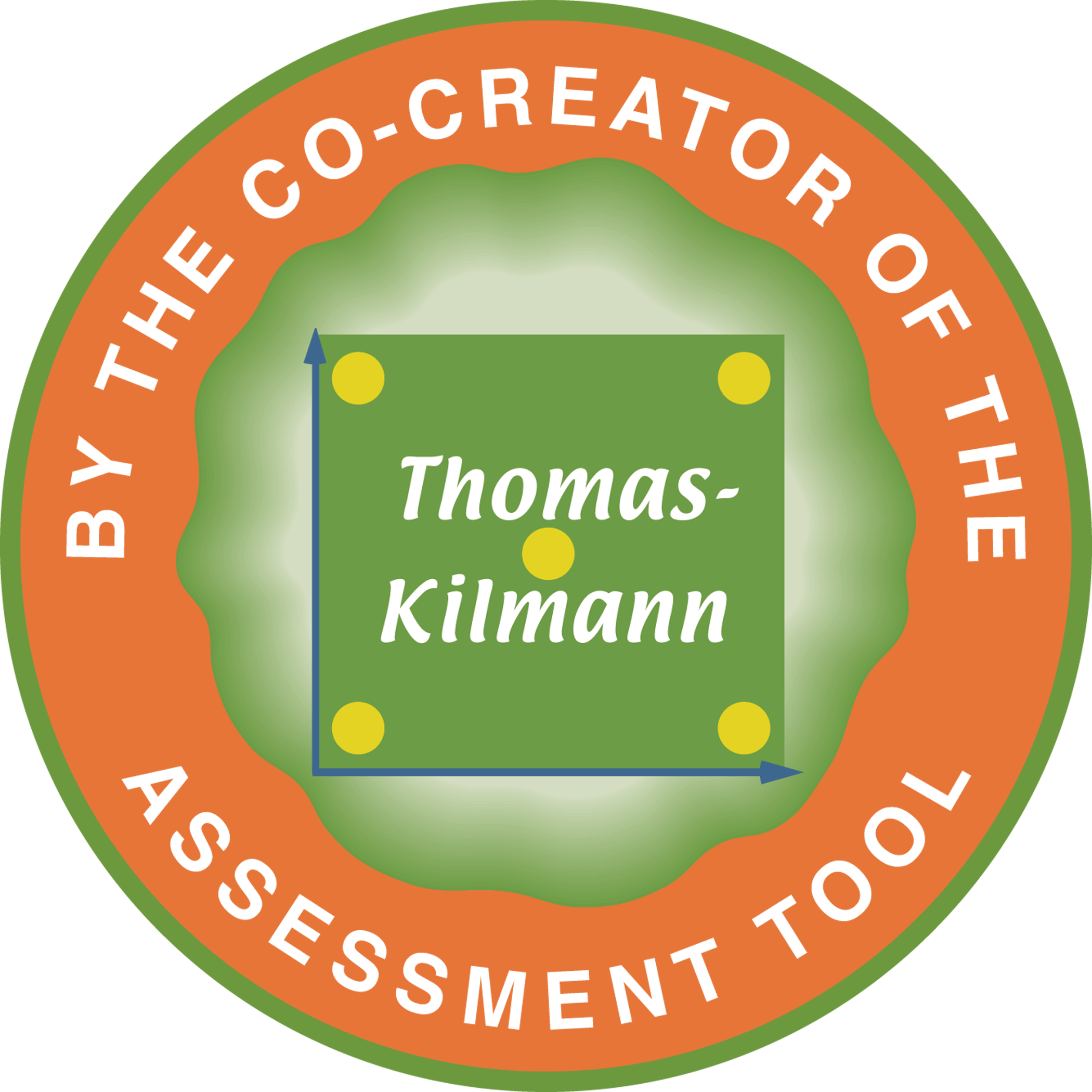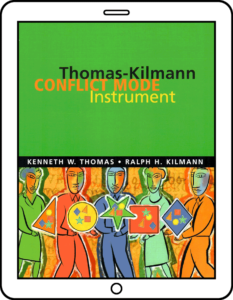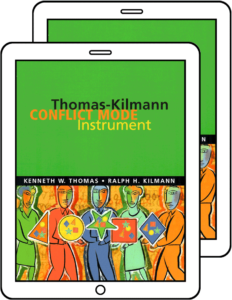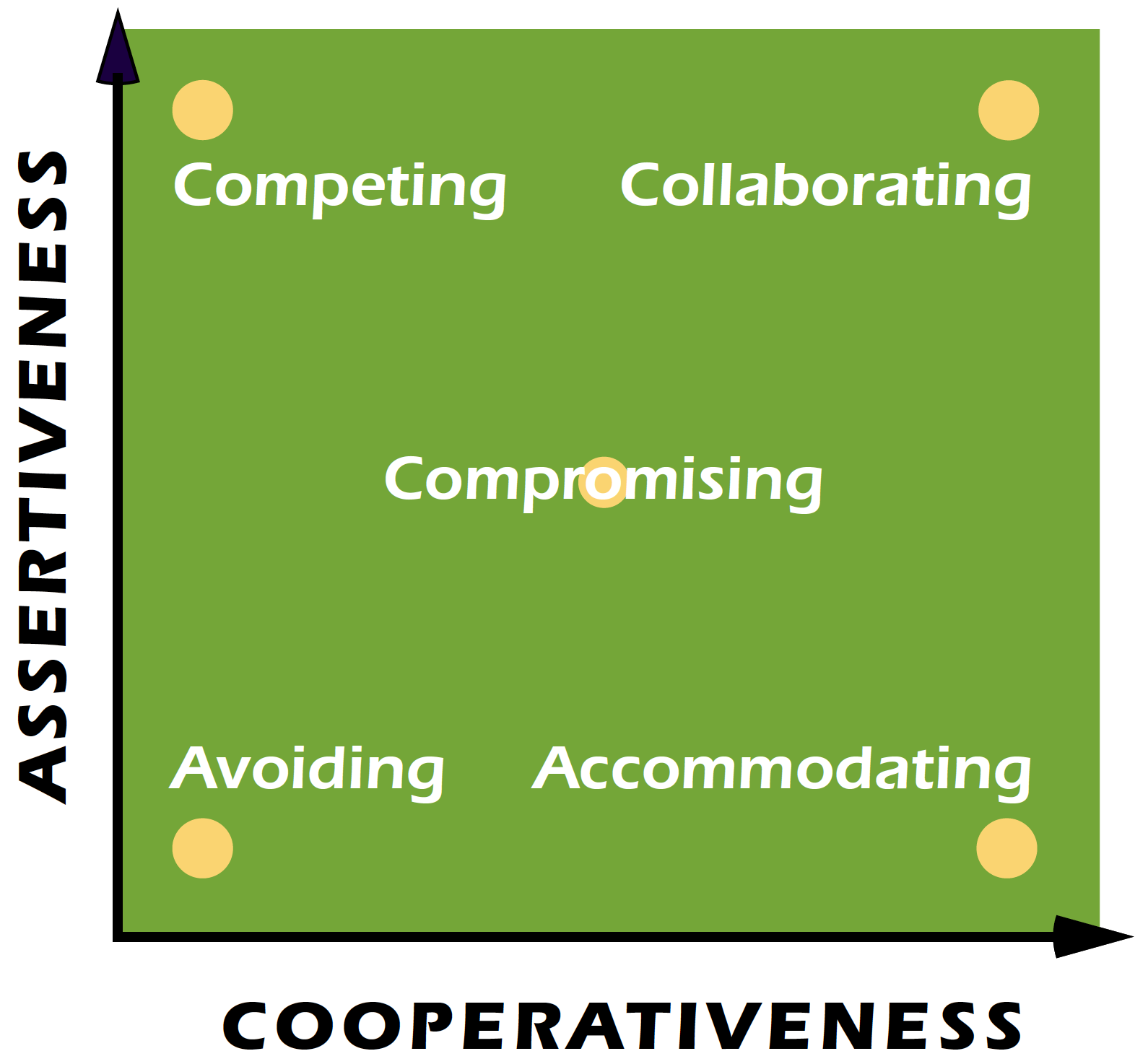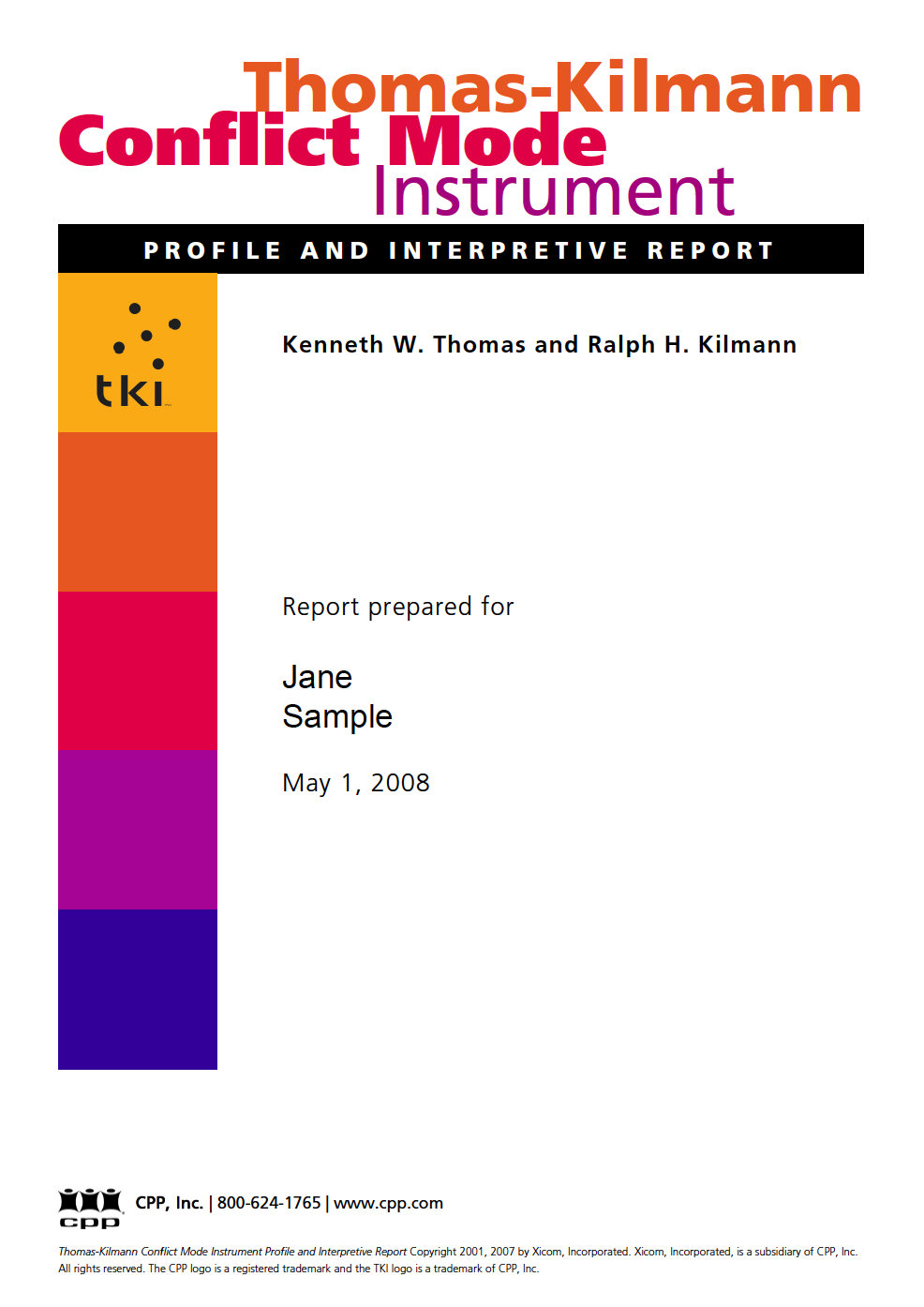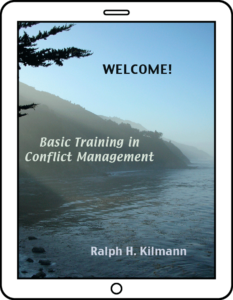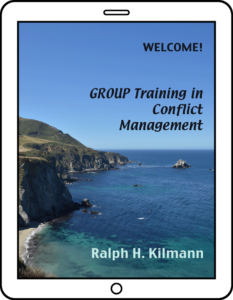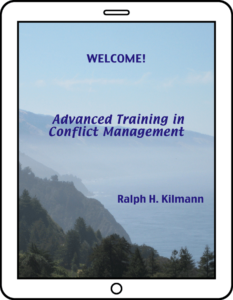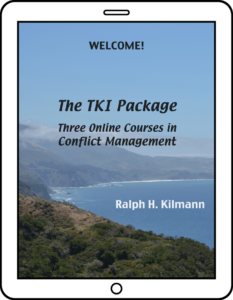01 Jun Take the Thomas-Kilmann Conflict Mode Instrument (TKI) Take this assessment tool and discover which of the five conflict modes you might be using too much or too little… or just right
Take the Thomas-Kilmann Instrument (TKI) directly from the person who co-created it:
Dr. Ralph H. Kilmann.
All his many articles, books, blogs, videos, courses, and TKI certification are available on this website.
TAKE THE THOMAS-KILMANN INSTRUMENT:
TWO OPTIONS
One TKI Assessment
Per Person
Taking the TKI allows you to discover whether you might be overusing or underusing one or more of five conflict-handling modes (collaborating, competing, compromising, accommodating, and avoiding), so you can improve how you manage conflict!
Two TKI Assessments
Per Person
By taking one TKI specifically for INSIDE your group and another TKI for OUTSIDE your group, you’ll discover how your leader, the culture, and the reward system might be having undue influence on how conflict is being managed in your group or team.
MEET THE TWO AUTHORS OF THE
THOMAS-KILMANN INSTRUMENT
Dr. Kenneth W. Thomas and Dr. Ralph H. Kilmann (August 2015):
“The Joy of Having Created the TKI Assessment!”
AN OVERVIEW OF THE
TKI ASSESSMENT TOOL
Because no two individuals have exactly the same expectations and desires, conflict is a natural part of our interactions with others. The TKI is an online assessment that takes about fifteen minutes to complete. Interpretation and feedback materials help you learn about the most appropriate uses for each conflict-handling mode.
PLEASE NOTE: Although Dr. Ralph Kilmann has always referred to his TKI as an “instrument” or as an “assessment tool” (to emphasize its neutral, non-judgmental intentions, since there are no right or wrong answers as such), the TKI assessment is, nevertheless, also referred to as the “TKI test” or the “TKI questionnaire” or, more generally, the “TKI Conflict Model.”
The Thomas-Kilmann Instrument has been the leader in conflict resolution assessment for more than forty years. This instrument requires no special qualifications for administration. It is used by Human Resources (HR) and Organizational Development (OD) consultants as a catalyst to open discussions on difficult issues and facilitate learning about how conflict-handling modes affect personal, group, and organizational dynamics. The TKI is also extensively used by mediators, negotiators, and many practitioners in the coaching profession (executive coaches, career coaches, business coaches, life coaches, etc.).
More than ten million copies of the TKI have been published since 1974. Besides its native English language, the TKI is also available in several other languges: Spanish (European and Latin American), French, Portuguese (Brazilian), Danish, Dutch, Swedish, Japanese, Russian, German, Italian, and Chinese (traditional and simplified).
The Thomas-Kilmann Instrument is designed to measure a person’s behavior in conflict situations. “Conflict situations” are those in which the concerns of two people appear to be incompatible.
In such conflict situations, we can describe an individual’s behavior along two dimensions: (1) assertiveness, the extent to which the person attempts to satisfy his own concerns, and (2) cooperativeness, the extent to which the person attempts to satisfy the other person’s concerns.
These two underlying dimensions of human behavior (assertiveness and cooperativeness) can then be used to define five different modes for responding to conflict situations:
- Competing is assertive and uncooperative—an individual pursues his own concerns at the other person’s expense. This is a power-oriented mode in which you use whatever power seems appropriate to win your own position—your ability to argue, your rank, or economic sanctions. Competing means “standing up for your rights,” defending a position which you believe is correct, or simply trying to win.
- Accommodating is unassertive and cooperative—the complete opposite of competing. When accommodating, the individual neglects his own concerns to satisfy the concerns of the other person; there is an element of self-sacrifice in this mode. Accommodating might take the form of selfless generosity or charity, obeying another person’s order when you would prefer not to, or yielding to another’s point of view.
- Avoiding is unassertive and uncooperative—the person neither pursues his own concerns nor those of the other individual. Thus he does not deal with the conflict. Avoiding might take the form of diplomatically sidestepping an issue, postponing an issue until a better time, or simply withdrawing from a threatening situation.
- Collaborating is both assertive and cooperative—the complete opposite of avoiding. Collaborating involves an attempt to work with others to find some solution that fully satisfies their concerns. It means digging into an issue to pinpoint the underlying needs and wants of the two individuals. Collaborating between two persons might take the form of exploring a disagreement to learn from each other’s insights or trying to find a creative solution to an interpersonal problem.
- Compromising is moderate in both assertiveness and cooperativeness. The objective is to find some expedient, mutually acceptable solution that partially satisfies both parties. It falls intermediate between competing and accommodating. Compromising gives up more than competing but less than accommodating. Likewise, it addresses an issue more directly than avoiding, but does not explore it in as much depth as collaborating. In some situations, compromising might mean splitting the difference between the two positions, exchanging concessions, or seeking a quick middle-ground solution.
Each of us is capable of using all five conflict-handling modes. None of us can be characterized as having a single style of dealing with conflict. But certain people use some modes better than others and, therefore, tend to rely on those modes more heavily than others—whether because of temperament or practice.
Your conflict behavior in the workplace is therefore a result of both your personal predispositions and the requirements of the situation in which you find yourself. The Thomas-Kilmann Instrument is designed to measure your use of conflict-handling modes across a wide variety of group and organizational settings.
See A Sample TKI Report:
TAKE THESE RECORDED
ONLINE COURSES TO
LEARN MORE ABOUT THE
THOMAS-KILMANN INSTRUMENT (TKI)
SO YOU CAN IMPROVE YOUR CONFLICT
RESOLUTION SKILLS AND STRATEGIES
BASIC TRAINING:
DISCOVER THE FULL
POTENTIAL OF TAKING
1 TKI ASSESSMENT
During our 2-hour BASIC Training in Conflict Management, not only will Dr. Kilmann help you interpret your TKI results, but you’ll also learn how to interpret other people’s results. You’ll gain the most value-added knowledge from your TKI assessment by deeply understanding the five modes, their two underlying dimensions (assertiveness and cooperativeness), and the three diagonal dimensions on the TKI Conflict Model.
GROUP TRAINING:
DISCOVER THE FULL
POTENTIAL OF TAKING
2 TKI ASSESSMENTS
During our 3-hour GROUP Training in Conflict Management, Dr. Kilmann will explain how to develop Group TKI Profiles, which are based on each member’s response to two TKIs, each with modified instructions, regarding their conflict-handling behavior: (1) INSIDE their group and (2) OUTSIDE their group (in all other settings in their life). Dr. Kilmann then interprets several very different Group TKI Profiles, which reveals the depth of this group analysis.
ADVANCED TRAINING:
HOW TO USE THE TKI
FOR ORGANIZATIONAL
PROBLEMS & CONFLICTS
Our 8-hour ADVANCED Training provides an even deeper understanding of the TKI. For example, you will learn how certain enduring psychological types predispose people to use different modes for resolving conflict. In this advanced course, you’ll also learn the ten key principles of group process and then you’ll learn the five steps and errors of problem management. In a nutshell, this more advanced material is precisely what will allow you to use the TKI to help resolve the most complex conflicts and problems in our communities, organizations, institutions, and nations.
THE TKI PACKAGE:
TAKE ALL THREE
TKI-BASED COURSES
AT A NICE DISCOUNT
If you would like to take our 3 TKI-based courses, you can purchase The TKI Package at a discount. Then, for 6 months, you’ll have access to all 12 hours of course videos, 3 course manuals (222 pages), and 2 TKI assessments. This package is a great choice for trainers, consultants, coaches, mediators, therapists, and peacebuilders who wish to gain mastery of the TKI assessment for applications with individuals, groups, and organizations. To earn our “Certification for the Thomas-Kilmann Instrument,” you must pass 2 Final Exams: (1) GROUP Training and (2) ADVANCED Training.
THE KILMANN
ORGANIZATIONAL
CONFLICT INSTRUMENT
Directly below, see Dr. Kilmann’s 12-minute video presentation that summarizes his latest assessment tool: The Kilmann Organizational Conflict Instrument. This diagnostic instrument has been designed to identify an organization’s systems and processes that are significantly undermining—hence, misdirecting—members’ use of those five conflict modes inside their organization or work unit, so the most troublesome “systems conflicts” can then be transformed to actively support the effective use of all five conflict modes in the workplace. In essence, the Kilmann Organizational Conflict Instrument fully appreciates that an organization’s systems and processes affect at least 80% of how conflict is addressed and resolved in the workplace, while individual preferences for using certain conflict modes affect, at most, about 20% of the observable conflict-handling behavior and results.
See this information-packed Dedicated TKI Page, which provides many free resources about this renowned assessment tool. And be sure to watch our free, very insightful, Videos for the Thomas-Kilmann Instrument. You can also read Dr. Ralph Kilmann’s Full-Length TKI Articles and TKI Blogs.




